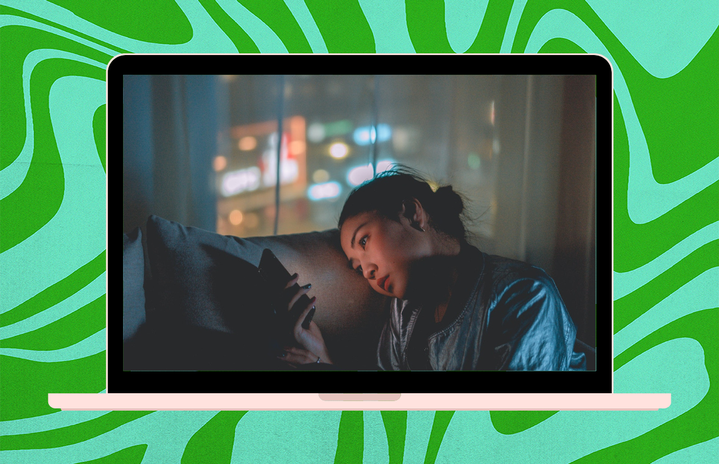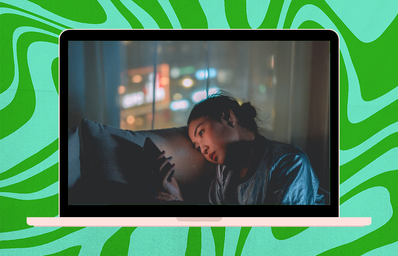Social media has become a huge part of our lives. We’re at a point where social media managers and content creators (and their work-life balance, or lack thereof) are evolving more than ever. With the emergence of Twitter, Instagram, and TikTok comes the dreaded social media scroll.
Social media management and content creation is undoubtedly a growing industry, according to Influencer Marketing Hub, and it’s only growing bigger: According to Influencer Marketing Hub, 29% of American kids want to be a YouTube star. There are around 50 million people who consider themselves a creator online, and 2 million creators globally who make six-figure incomes. The ability to monetize social media content means, however, that it’s important to establish a work-life balance — especially when you’re online so often.
But how can you do that when your line of work depends on you knowing what’s happening online at all hours of the day? Her Campus spoke to five different people within the social media realm to discuss their overall relationship with social media, and how their career impacts their daily lives.
Social media content creation is a double-edged sword.
Alyssa Sprague, social media manager of True Self Babe, tells Her Campus that she is grateful for social media due to the ever-evolving connections. “I work every day on social media platforms, so my relationship with social media is twofold,” she says. “Every day I make new connections from creators to my own followers or random people. I also am given a voice and a platform to share all the different types of media I create. I am creative at heart, and social media is really just another method of expressing my many forms of art and helping others do the same.”
Sprague isn’t the only one who emphasizes creativity when it comes to social media. Ellie Kinney, social media editor of Her Campus Media, says, “People who work in social media are the most creative people you’ll ever meet.”
On the contrary, social media can cause stress among social media professionals, something that should be no surprise to Gen Z — 48% of Gen Z respondents said in a 2019 study that social media makes them feel anxious. Rhonda Watts, a TikTok creator and digital marketing specialist, explains how the stress felt by creators can be caused by the “anxiety and pressure of posts not ‘performing well,’ i.e. not getting as much engagement or as many views or likes as I expected or hoped for.” Watts added that the lack of engagement on a post doesn’t fulfill her purpose for the clients that she works with.
Natalie Collins, social media manager of Dallas SEO Dogs Inc., named fact-checking as a source of stress in her daily life, saying, “Making sure you are providing the most accurate and correct information can be stressful for social media managers.” Her main goal in her work is to ensure she builds that connection with clients.
For Kinney, the aspect of managing social media that stresses her out the most is “making errors on tagging people, or even having a typo in the caption. People see that, and they have called me out before.” She takes this as a learning experience, explaining that it reminds her to slow down with her work.
Sprague reinforces the idea of insecurity with posts not performing well. “Sometimes it can be disheartening to see the content you worked really hard on not do as well as you thought. It’s all about managing your expectations so you can maintain that positive relationship with social media. Don’t be afraid to get off your damn phone!”
It’s important to disconnect from the screens.
In order to combat the daily elements of stress with social media, each specialist utilizes different methods to personally disconnect. Michael Kwan, content lead at WordFinder by YourDictionary, tells Her Campus, “One measure I have is using the app timers on my phone to limit the amount of time I can use certain apps. I enjoy listening to podcasts or audiobooks when I go for my evening walks, which helps to deter me from taking out my phone instead. Offline time with my kids helps a lot too.”
Watts immerses herself in books when she’s not on social media. “I am a big reader, and reading has always been a way for me to unwind and escape,” she says. “I have an e-reader, but I’ve found that since I have increased my time with screens in other aspects of life, I appreciate physical books more. I definitely still use my Kindle regularly, but I have a new fondness for physical books!”
For some, physical activity and movement are key in taking time away from the Internet. Kinney explains her love for dancing: “I truly put my phone away when I’m dancing. I teach classes during the weekend, and I try to take two to three classes a week at my studio.” She adds that she loves the way that movement allows her to disconnect and destress.
Collins agrees, “I love to work out in order to decompress and disconnect from screens. Whether it be a nice hike outdoors or a soothing yoga session, I find taking time for myself without screens can help keep me balanced.” Allowing a sense of movement such as yoga not only benefits your body, but also your mind. Exercise of any kind releases dopamine, serotonin, and norepinephrine, all of which can improve your overall mood.
As a content creator, work-life balance is essential.
For most content creators, screen time plays into their lives even outside of their work shift, so developing a healthy daily routine is key. Sprague says, “If you’re an aspiring digital content creator or social media manager, be sure to create structure and playtime in your day-to-day. I create free time for myself throughout every day, that way I’m not always looking at a screen and can help myself avoid digital burnout.”
It’s also important to utilize social media tools in order to build that work-life balance for yourself, Kwan explains. “Automate and outsource what you can, within reason, and have contingency plans in place for when you might not be available,” he advises. “Scheduling tools and automatic analytics/metrics dashboards can save you a lot of time and headache.” Tools like Meta Business Suite, Hootsuite, and Sprout Social can help you plan your social content in order to take a break and develop a work-life balance.
Social media impacts the majority of people nowadays. Whether it’s someone from the Baby Boomer generation posting “Good morning” on their Facebook timeline, or a member of Gen Z swiping up on a Snapchat story, these platforms have become the center of our communication. Being part of an industry that’s rapidly growing can be exciting, but it’s always important to establish a strong work-life balance. Scheduling a routine that allows you to disconnect from the world of constant connection is beneficial, especially when it’s your entire career.


